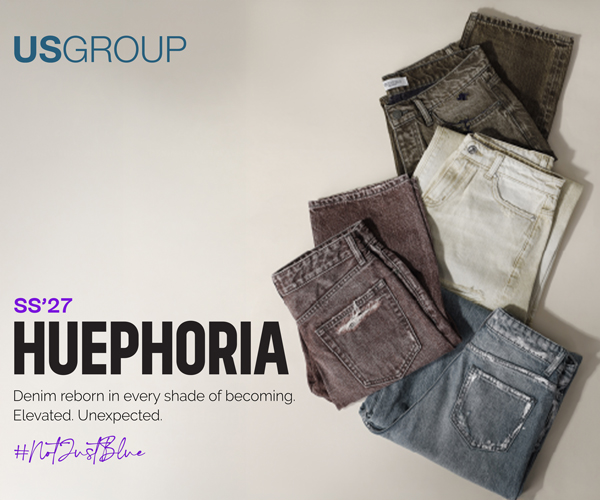Stretch denim that lasts — but doesn’t last too long

Cone Denim has partnered with Intrinsic Advanced Materials for a fabric it claims could reduce synthetic microfibre pollution and minimise plastic in landfills
Cone Denim has developed a stretch denim that it suggests could reduce synthetic microfibre pollution in the oceans and minimise the accumulation of plastic in landfills by using CiCLO, a technology that allows plastic-based fibres to biodegrade more like natural fibres.
News of this collaboration came after several months of announcements regarding initiatives, partnerships and product releases with sustainability-centred objectives at their core. Cone Denim was established around the turn of the 20th century by founders who were “early adopters of many progressive initiatives at that time,” according to Steve Maggard, president of Cone Denim. These included the wastewater treatment systems and water and steam recovery.
Cone is the first in the industry to incorporate the CiCLO fibres into its denim fabrics, which are part of the spring/summer production range.
Making synthetics act like naturals
Here’s how CiCLO (pronounced seklo, and translates to “cycle”) technology works: it is an additive that’s homogeneously blended with virgin or recycled PET chips at the beginning of the fibre manufacturing process during melt extrusion. The technology becomes permanently embedded in the matrix of the plastic.
The additive is an invention from Intrinsic Advanced Materials, a joint venture between Parkdale Advanced Materials, the fibres and yarns division of Parkdale Mills, and Intrinsic Textiles Group, a start-up out of California’s Silicon Valley. The Intrinsic Advanced Materials team includes scientists, engineers and textile industry veterans who describe themselves as being outdoors enthusiasts who feel passionately about protecting the planet. Their aim is to develop solutions that are easy for the textile industry to implement.
“We invented CiCLO because we believe ‘built to last’ shouldn't mean ‘here forever,’” Andrea Ferris, co-founder and CEO of Intrinsic Advanced Materials, tells Inside Denim. She cites disconcerting figures, such as 44 million pounds of synthetic textile waste is sent to landfills every day in the US alone. “Like most plastic,” she says, “these materials persist indefinitely.”
CiCLO allows synthetic fibres to behave more like natural fibres, which typically do not persist indefinitely when they end up in the environment. Ms Ferris says it’s difficult to put exact numbers on how long it takes treated fabrics to biodegrade in every environment because natural conditions vary so greatly, but the tests conducted by third party labs compared the rate and extent of biodegradation of CiCLO polyester samples with standard polyester samples. The company’s longest running study showed full biodegradation of a treated polyester fabric at around three and a half years; in that same period, the comparable fabric made with standard polyester had experienced only 6% biodegradation.
Moreover, as the textile industry knows all too well, long before textiles end up in a landfill, microfibres that are shed through laundering start to accumulate. Ms Ferris says plastic microfibre pollution in the oceans is estimated to be the equivalent of 50 billion plastic bottles every year.
“Ideally, textiles would not shed at all, but that's not reality,” she says. Products made with CiCLO fibres have what Ms Ferris calls “a built-in solution to the fugitive synthetic microfibres that are persistent in the environment”. Tests have proven them to have accelerated rates of biodegradation in not only sea water, but also wastewater treatment plant sludge and soil.
While treated polyester can replace standard polyester in any type of denim, Cone Denim decided to use it to reduce the environmental impact of one of its most popular fabrics.
“Stretch denim is one of the most largely consumed denim products globally, and we do not see this going away anytime soon,” Pierette Scavuzzo, Cone’s director of product design, tells Inside Denim. “Polyester is a key ingredient to producing superior stretch in denim in regards to stretch and recovery. When we discovered CiCLO we felt it was a step forward in offering a more sustainable polyester component with a focus that extended beyond recycled content.”
To Ms Ferris, the decision to treat synthetic fibres with this technology should be an easy one to make. “Manufacturers can easily substitute their current polyester with CiCLO polyester,” she says. “They still offer the same quality product, but with an improved environmental impact.”
At the same time, however, she wants the industry to know that Intrinsic Advanced Materials have found a solution to only part of the problem: “We encourage implementation of complementary solutions that reduce shedding, increase longevity of use and keep textiles out of landfills,” she says.
Because their invention was developed specifically for the requirements of textiles, they decline enquiries related to the unnecessary use of single-use plastics. “We are,” she adds, “a team of environmentalists at heart.”
Partnering with a reputable business like Cone is particularly important in what can be a delicate and murky area. “Biodegradation in general is a convoluted and misunderstood topic,” she says. “The category of biodegradable plastics adds yet another layer of complexity, especially when considering legal requirements for how they may be marketed.”
This means that bringing their technology to market responsibly requires Intrinsic Advanced Materials to control distribution and quality through their global network of certified fibre manufacturing partners, offer traceability and authentication of fibres and yarns, educate customers on the science of biodegradation and testing methodologies, advise on allowable marketing claims and stay committed to R&D.
“Plenty of big brands and manufacturers prefer to follow when it comes to complex technologies or topics, like biodegradation. Risk aversion can impede innovative products from ever making it to market,” she says.
Cone’s sustainability mission
Mr Maggard agrees that his company is in a position to demonstrate the value of emerging technologies. “Given our global presence,” he says, “we can explore capabilities around the world and drive awareness and action to provide newer sustainable solutions to our customers.”
So far, Cone’s customers’ reception for CiCLO treated denim has been encouraging. Pierette Scavuzzo believes what’s been so compelling for its brands is “the product checks many boxes in regards to aesthetics, hand and stretch, and a new approach to address polyester and microplastics in the environment.”
About a month before this partnership was announced, Elevate Textiles published sustainability targets for 2025. (Elevate, formerly known as International Textile Group, is Cone’s parent company.) Goals included an 80% increase in sustainably-sourced cotton and 50% increase in recycled polyester content; reducing water consumption in manufacturing operations by 25% per unit of production; and reducing greenhouse gases by 2.5% per year.
Earlier in 2019, Cone announced it would be the first to bring Cadira Distilled Indigo to the western hemisphere. The line, according to the company, combined eco-friendly indigo with a reducing agent to create salt-free dye that eliminated hydrosulphite.
Soon after, a new organic cotton capsule collection came out. Next came a partnership with garment finishing technology company Jeanologia on a water conservation initiative and an expanded commitment to ZDHC Roadmap to Zero Programme. Together these pieces show a picture of a company in agreement with Ms Ferris, that achieving sustainability requires complementary solutions.
Pierette Scavuzzo sees the partnership as an important piece of that picture. “While efforts are being made to recycle and reuse garments, the reality is that millions of clothing items end up in landfills each year. Our goal is to make any difference whether small or in large volumes,” she says.













